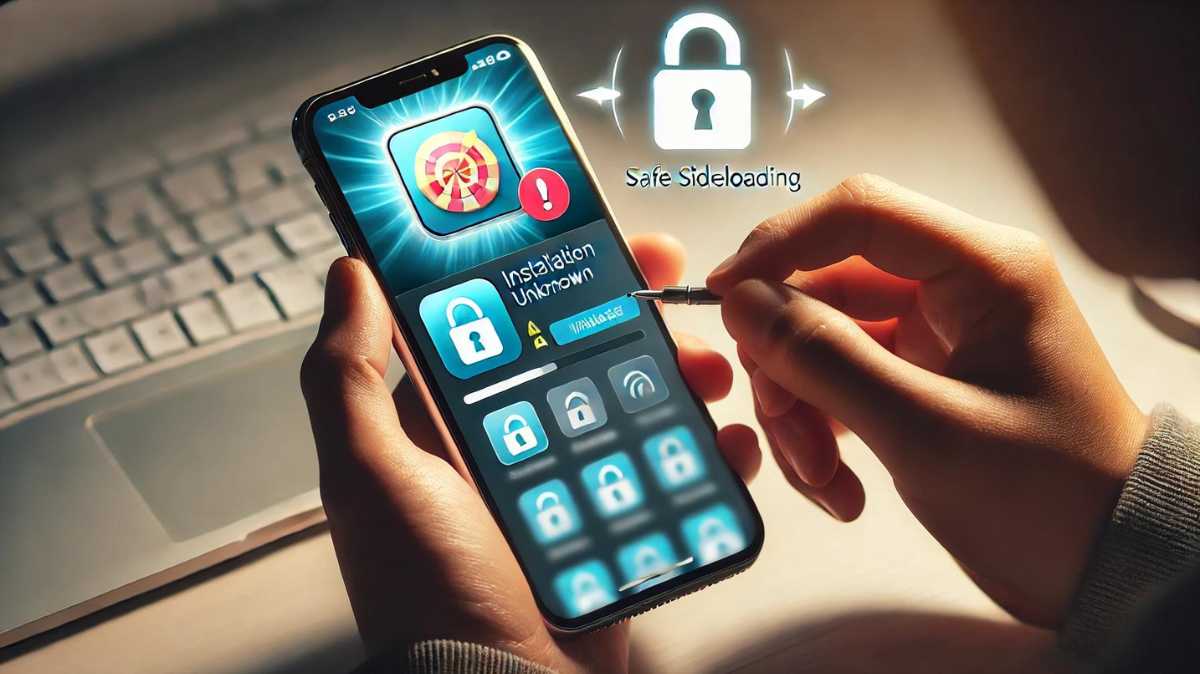There are countless ways to get the most out of your devices. One of those methods is sideloading apps—installing applications from sources outside of official app stores. While sideloading can provide access to a broader range of apps, it also carries risks if done incorrectly. Understanding how to sideload apps safely is essential for protecting your device and personal data from potential threats.
Table of Contents
What Is Sideloading and Why Should You Care?
Sideloading refers to the process of installing applications on a device without using an official app marketplace like Google Play Store or Apple’s App Store. This can be particularly useful for downloading apps that aren’t available in your region, apps removed from official stores, or custom-built software.
However, sideloading apps opens your device to a wider array of risks, including malware, spyware, and unauthorized access to your data. Learning how to sideload apps safely is the best way to enjoy the benefits without compromising your security.
Is It Legal to Sideload Apps?
The legality of sideloading apps varies by region and device. Generally, sideloading is legal as long as you’re not distributing or installing pirated software. Officially, Apple discourages sideloading on iOS devices, while Android allows it with appropriate permissions. It’s essential to ensure that the apps you sideload don’t violate terms of service or local laws.
Why People Sideload Apps
Before diving into the technicalities of sideloading, let’s explore why someone might want to sideload an app:
- Access to geo-restricted content: Certain apps may not be available in all countries, and sideloading can bypass these restrictions.
- Older app versions: Sometimes, the latest version of an app may have undesirable features or bugs, prompting users to sideload older, more stable versions.
- Custom software: Developers often test or distribute applications through sideloading to avoid fees or limitations imposed by official app stores.
- Removed apps: Some apps get removed from the official store, either due to policy violations or developer decisions, yet still hold value for certain users.
While the advantages are clear, it’s essential to learn how to sideload apps safely to avoid turning these perks into security nightmares.
How to Sideload Apps Safely on Android
Android devices are more flexible when it comes to sideloading apps compared to iOS, but safety precautions are still necessary. Follow these steps to ensure a smooth and secure sideloading experience:
Enable “Unknown Sources” Cautiously
Before sideloading any app, you need to enable “Install unknown apps” in your Android device’s settings. Here’s how to do it:
- Open Settings on your Android device.
- Navigate to Apps & notifications.
- Tap on Advanced and select Special app access.
- Choose Install unknown apps, then select the app (e.g., Chrome) you’ll use to download the APK file.
- Toggle the switch to allow installations from this source.
Remember to turn this off after installing the app to reduce security risks.
Download APKs from Trusted Sources
The most crucial part of sideloading apps safely is ensuring the APK file you’re installing comes from a reputable source. Trusted websites like APKMirror, APKPure, and F-Droid vet the files for malware and ensure they’re genuine copies of official apps.
Scan the APK File for Malware
Even if you download from a trusted site, it’s a good practice to scan the APK file for malware. Many mobile security apps, such as Avast Mobile Security and Kaspersky Mobile, offer built-in APK scanning features. Alternatively, you can use online services like VirusTotal to upload and scan files for potential threats.
How to Sideload Apps Safely on iOS
Unlike Android, Apple’s iOS ecosystem is more restrictive, making sideloading a bit trickier. However, there are still safe ways to sideload apps on iOS devices.
Use Cydia Impactor or AltStore
Cydia Impactor and AltStore are tools that allow you to sideload apps onto your iOS device without jailbreaking it. While jailbreaking is another option, it voids your warranty and significantly increases your security risks.
- Cydia Impactor: This tool lets you sign apps and install them directly onto your iPhone or iPad. It requires a computer and an Apple Developer account.
- AltStore: AltStore is a safer alternative to sideload apps on iOS. It allows you to install apps by creating a local App Store on your device, but it requires the use of a Mac or PC.
Be Aware of Certificates
Sideloaded apps on iOS require developer certificates to run. Apps signed with an enterprise certificate can be revoked by Apple, which will prevent them from launching. It’s crucial to download apps that are signed with legitimate certificates and to check for reviews from other users about certificate issues before installation.
What Are the Risks of Sideloading Apps?
While sideloading gives you access to more apps, it comes with inherent risks, including:
- Malware: Downloading APKs from unverified sources can expose your device to malicious software. Malware can steal your personal data, damage your system, or display intrusive ads.
- Data Leaks: Some sideloaded apps may ask for excessive permissions, potentially leading to unauthorized data access or leakage.
- App Instability: Apps from unofficial sources might not be optimized for your device, resulting in crashes, poor performance, or incompatibility with your operating system.
- Legal Risks: In some regions, sideloading apps, especially pirated software, may lead to legal consequences. Always ensure you’re within legal limits when sideloading apps.
Best Practices for Sideloading Apps Safely
To mitigate these risks, follow these best practices:
- Research the Source: Always research the website or service providing the APK. Check reviews and online forums to ensure it has a good reputation.
- Check App Permissions: Review the permissions requested by the app. If an app requests access to sensitive information or functions that seem unnecessary, it’s a red flag.
- Use Antivirus Protection: Install mobile security apps like Avast Mobile Security or Kaspersky Mobile to protect your device from malware. These tools can scan apps and monitor your device for suspicious activity.
- Backup Your Data: Before sideloading, backup your important files and settings. This ensures that if something goes wrong, you can restore your device to a safe state.
- Regularly Update Your Device: Ensure that your operating system and security patches are up to date. Outdated software is more vulnerable to attacks.
Sideloading on Other Devices
The concept of sideloading isn’t exclusive to mobile phones. You can also sideload apps on devices such as:
- Amazon Fire Stick: Sideload apps using APK files to access apps outside the Amazon Appstore.
- Windows and macOS: On desktop platforms, sideloading can refer to installing software from outside the official Windows Store or Mac App Store. Exercise similar precautions as with mobile devices, such as checking for malware.
Common Mistakes to Avoid When Sideloading Apps
Even when you know the process, there are some common mistakes you’ll want to avoid:
- Ignoring File Sources: Never download APK files from unknown or suspicious sites.
- Skipping Malware Scans: Always scan the APK file for viruses or malicious code, no matter how trustworthy the site may seem.
- Granting Excessive Permissions: Only grant the permissions the app truly needs to function.
- Forgetting to Disable “Unknown Sources”: After you sideload an app, immediately turn off the ability to install from unknown sources to protect your device.
FAQs
Can sideloading apps damage my device?
Yes, if you download malicious or incompatible apps, they can cause system instability or data loss.
Is sideloading apps legal?
In most cases, sideloading is legal, but distributing or downloading pirated apps is illegal.
How do I know if an APK is safe?
Use reputable sites, check app permissions, and always scan the APK with antivirus software before installing it.
What’s the difference between jailbreaking and sideloading?
Jailbreaking involves bypassing security measures on iOS devices, whereas sideloading simply refers to installing apps outside of the official store.
Can I sideload apps on my iPhone without jailbreaking?
Yes, tools like AltStore and Cydia Impactor allow you to sideload apps without jailbreaking your device.
How do I uninstall a sideloaded app?
You can uninstall sideloaded apps the same way you uninstall regular apps, through your device’s app management settings.
Conclusion
Sideloading apps can open up a world of possibilities, but it must be approached cautiously. Learning how to sideload apps safely ensures you can enjoy the freedom of third-party apps without risking your device’s security. Always verify the source, scan files for malware, and be mindful of the permissions you grant. With the right precautions, sideloading can be a valuable tool in maximizing the potential of your device.
Author

An aspiring business leader, I am working towards my dream of graduating from Stanford University with a degree in Business Management. Passionate about sharing knowledge, I strive to empower others through education and collaborative learning.
View all posts


